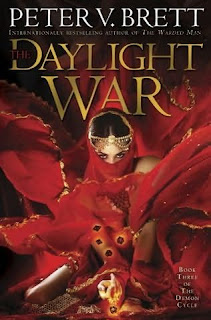At Worldcon I had the pleasure of moderating a panel featuring Harriet McDougal (Robert Jordan's widow), Maria Simons (one of his assistants) and fantasy authors Wesley Chu and Peter Brett, who spoke about the influence of Wheel of Time on their works. However, there was a fair amount of discussion by Harriet about the new companion volume to the series. This can be summed up as follows:
- The Wheel of Time Encyclopedia is dead! Long live The Wheel of Time Companion as it will now officially be called.
- The book will be 350,000 words long (comparable to several of the novels in the series; the longest, The Shadow Rising, is 389,000 words).
- The book will feature a lot of new artwork, arranged by Irene Gallo at Tor.
- Publication date likely to be November 2015.
- The book will feature all of the already-published maps and also some new ones, including one of Thakan'dar.
- The book will have a large vocabulary of the Old Tongue, with a minimum of 1,000 words.
- The book will feature character profiles and sketches for almost every character in the series. Even Bela has her own entry.
- The book will be written from a post-AMoL POV. It will have spoilers for the entire series.
- The series is finished and done. Tor offered a lot of money and tried to persuade Harriet into doing more, but Harriet put her foot down and said no. The Wheel of Time ends with A Memory of Light and the companion volume.
- There were several unfulfilled contracts when Robert Jordan passed away, including for the Seanchan trilogy. Apparently the money involved was massive, worth many times the value of Harriet's house. Tor worked with the estate to re-write the contracts to substitute the companion book instead.
- Robert Jordan wrote one line about the planned Seanchan trilogy: Mat Cauthon playing dice in a grubby alleyway in Ebou Dar (not verbatim). That was it.
- Harriet named about 75% of the chapters in the series.
- Harriet vocally re-enacted Bela's death-whinny from AMoL.
- The panel spent an intense five minutes arguing about Bela's death. When I tried to suggest that we talk about the human characters who died, no-one was really interested. It was all about the horse.
- Jordan tried to protect Maria from spoilers in the work he had her do for him. She eventually persuaded him she could handle them. Almost the first thing he then gave her was Verin's full backstory. This was somewhere around the time Path of Daggers came out.
- The oddest research request was Jordan asking how babies feel when they are born. This was eventually used in the bonding scene in Winter's Heart.
- The movie/TV rights situation is beginning to become clearer. Red Eagle sold the film rights on to Universal and it now looks like the rights could return to the Jordan Estate at some point. There is apparently interest from other companies in the rights given the success of other fantasy projects on TV and in film at the moment.










